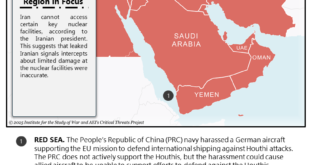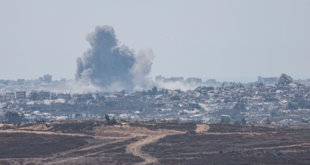OCCUPIED JERUSALEM (AP) — Israel failed to achieve all its objectives in its summer war against Hizbollah fighters in Lebanon, the Israeli army chief admitted Tuesday, but he rejected calls to resign as a result.
Summing up internal army inquiries into the war, which ended inconclusively in a ceasefire after 34 days of fighting, the army chief of staff, Lt. Gen. Dan Halutz, said Israeli forces caused considerable damage to Hizbollah and killed “hundreds of terrorists”.
At a briefing for Israeli military correspondents carried by local TV channels, he added: “We were not successful in reducing the short-range rocket fire on Israel’s north until the ceasefire.”
Hizbollah fired about 4,000 rockets at Israel during the fighting. Israel pounded Lebanon with air strikes at Hizbollah targets and infrastructure, and ground forces swept through south Lebanon. “We attacked the Katyushas [rockets], but unsuccessfully,” he said.
“There were cases in which officers did not carry out their assignments, and cases in which officers objected on moral grounds to their orders,” Halutz said, an apparent reference to resistance against attacking south Lebanese towns and villages.
He said these instances of refusal “ran counter to the army’s basic values”. He said a senior officer was suspended as a result.
Halutz said it would be a mistake to use the military now to try to free the two Israeli soldiers captured in a cross-border Hizbollah raid, which set off the fighting — though that was one of the goals stated at the outset of the conflict.
Halutz, who is under pressure to step down because of the shortcomings of the war, said he decided to stay on and “correct what can be corrected.” He said resignation now would be “running away,” adding: “I have not heard my superiors calling on me to resign. If they do, I will respond.” He noted conclusions of an inquiry by a former chief of staff that included vague definitions of goals and faulty work in command centres.
Halutz indicated that reserve soldiers would be called up for longer annual service to undergo better training, and said a plan to shorten the length of regular service, now set at three years, would be delayed.
A committee appointed by the government is in the midst of its investigation of the war and its outcome. The internal army inquiries did not call for resignations, but the government committee has the power to do so. Halutz said if that committee called for his resignation, “of course” he would comply. Defense Minister Amir Peretz has made the same pledge.
The conflict ended August 14 with a UN Security Council resolution that posted a reinforced peacekeeping force in south Lebanon with a mandate to keep the area clear of armed forces.
The fighting left more than 1,000 people dead on both sides, according to the UN and Israeli and Lebanese officials. Lebanon’s Higher Relief Council, a governmental group, says the majority of those were Lebanese civilians.
UNICEF also says most of those killed were civilians, and that about a third of them were children.
Of the total deaths, 159 were in Israel, including 39 civilians who were killed in rocket attacks.
Israel claimed 600 Hizbollah fighters were killed but that figure was not substantiated, with the group acknowledging only 250 of its fighters killed.Â
 Eurasia Press & News
Eurasia Press & News


